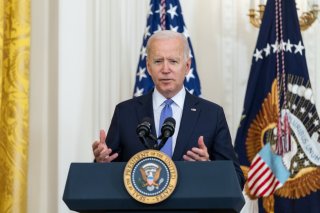Biden Lays Out Plan for Dealing with Supply Chain Shortages
“By staying open seven days a week, through the night and on the weekends, the Port of Los Angeles will open—over 60 extra hours a week it will be open.”
There are numerous ongoing shortages of parts and products throughout the U.S. economy, on everything from semiconductors to ammunition to bacon. And it’s beginning to be a political problem for the Biden Administration.
On Wednesday, President Joe Biden addressed the issue in White House remarks. After explaining what a supply chain is and how it works, the president announced that the port of Los Angeles would go to a twenty-four-hour service. It joins the Port of Long Beach, which did the same thing earlier this fall.
“Today, we have some good news: They’re going to help speed up the delivery of goods all across America,” the president said. “After weeks of negotiation and working with my team and with the major union and retailers and freight movers, the Ports of Los Angeles—the Port of Los Angeles announced today that it’s going to be—begin operating 24 hours a day, 7 days a week.”
Biden also stated why this is an important step.
“Traditionally, our ports have only been open during the week—Monday through Friday—and they’re generally closed down at nights and on weekends,” Biden said. “By staying open seven days a week, through the night and on the weekends, the Port of Los Angeles will open—over 60 extra hours a week it will be open. In total, that will almost double the number of hours that the port is open for business from earlier this year.”
The president also announced a number of partnerships with Walmart, Target, Home Depot, Samsung, UPS, and FedEx to assist in moving the products.
Also on Wednesday, the Administration held what it called a “Virtual Roundtable on Collective Efforts to Address Global Supply Chain Bottlenecks.” Participants included Vice President Kamala Harris, Treasury Secretary Pete Buttigieg, National Economic Council Director Brian Deese, and the heads of the ports in Los Angeles and Long Beach, along with several CEOs and labor leaders.
“Labor leaders made clear their support for this effort, and business leaders announced new commitments to move their cargo during the newly available night time and weekend hours,” the White House readout of the meeting said. “Participants discussed how the movement of cargo during less congested times will allow trucks to move more quickly on highways during less crowded night time hours, and truckers at the ports can drop off and pick up loads more quickly. These commitments from some of the nation’s biggest companies during off-peak hours should increase small businesses’ ability to move their goods during the peak hours, including those exporting their goods.”
Another topic that came up was Biden’s proposal for infrastructure spending.
“They discussed the importance of the Infrastructure Investment and Jobs Act and Build Back Better legislation, which would make a generational investment in our workers, our infrastructure, and our supply chains and create a more resilient and globally competitive goods movement system in the U.S.,” the readout said.
Stephen Silver, a technology writer for The National Interest, is a journalist, essayist and film critic, who is also a contributor to The Philadelphia Inquirer, Philly Voice, Philadelphia Weekly, the Jewish Telegraphic Agency, Living Life Fearless, Backstage magazine, Broad Street Review and Splice Today. The co-founder of the Philadelphia Film Critics Circle, Stephen lives in suburban Philadelphia with his wife and two sons. Follow him on Twitter at @StephenSilver.
Image: Wikimedia Commons.

